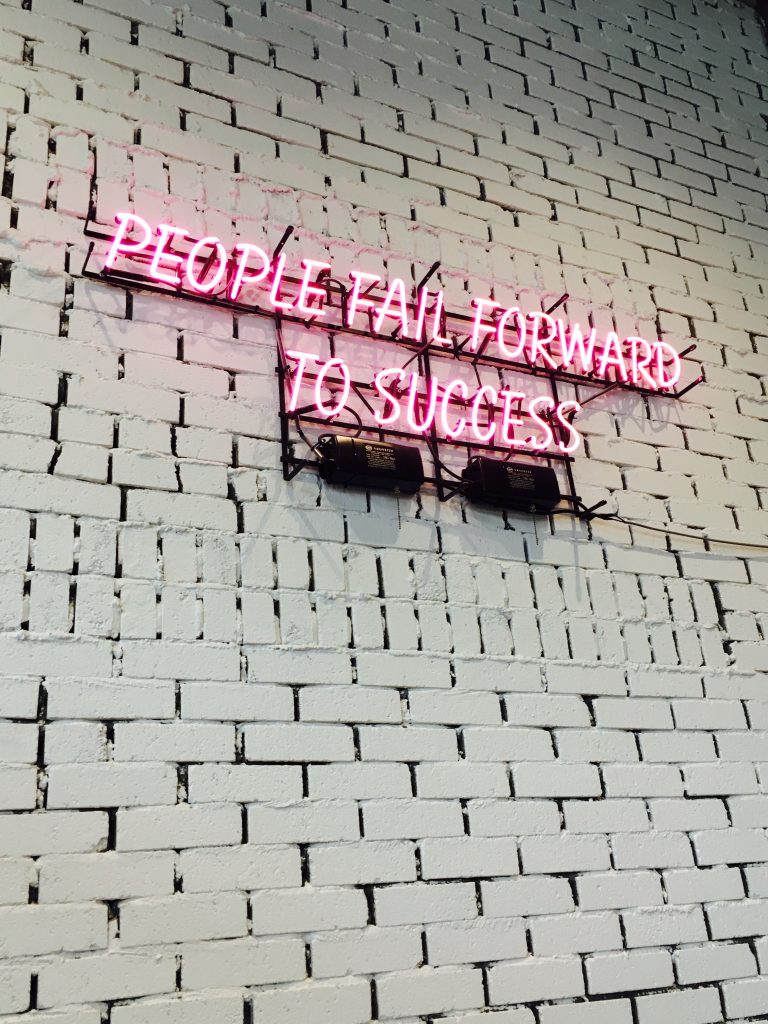The “Right” Way to Fail
Sophia Mun
Nobody wants to fail. Failure is avoided at all costs. But, according to Jerry Useem, an editor at the Atlantic, there are three things to know about failure: 1) It happens. 2) It can be destructive in ways you have never imagined. 3) Believe it or not, there’s a right way to do it.
Do you agree with “Failure is an option”? Then, stay tuned to this blog sharing two big ideas about the right way to do it: 1) Separate the failure from the person 2) View failure as a learning opportunity.

Separate the Failure from the Person
Retracting the steps to understand what went wrong helps you to be less emotional and go straight to failure itself. The first step to deal with failure is to accept it. If we don’t admit it, there is nothing to talk about. So, you have to admit something has been proven wrong. Then, analyze the failure with the following questions: “What happened?”, “Why did it happen?”, “Is it because of you?”, “Or is it because of the situation?”
Attribution theory is concerned with how people explain the causes of behavior and events (Fiske & Taylor, 1991). The attribution literature commonly distinguishes between dispositional and situational influences (Harvey et al., 2014). The key to deal with failure is differentiating dispositional (internal such as personality traits) and situational (external) attributions of failure. If you make a dispositional attribution, you might think for example, “This went wrong because I did not do my best”. If you make a situational attribution, you will find causes from the situation. Because individuals are biased by the Fundamental Attribution Error, which causes one to overestimate the role of disposition (Ross, 1997), it would be much easier to differentiate self from failure if you make a situational attribution. But, even when you believe you failed because of what you did, failure can be told as something that happens to you and not something that you are.
Separate the failure from the person. Failure is something you did or that happened to you, not something that defines you.
Washing Disciples’ Feet
This reminds me of the story of John 13 about Washing Disciples’ feet
1 It was just before the Passover Festival. Jesus knew that the hour had come for him to leave this world and go to the Father. Having loved his own who were in the world, he loved them to the end. 2 The evening meal was in progress, and the devil had already prompted Judas, the son of Simon Iscariot, to betray Jesus. 3 Jesus knew that the Father had put all things under his power and that he had come from God and was returning to God; 4 so he got up from the meal, took off his outer clothing, and wrapped a towel around his waist. 5 After that, he poured water into a basin and began to wash his disciples’ feet, drying them with the towel that was wrapped around him. 6 He came to Simon Peter, who said to him, “Lord, are you going to wash my feet?”
7 Jesus replied, “You do not realize now what I am doing, but later you will understand.” 8 “No,” said Peter, “you shall never wash my feet.” Jesus answered, “Unless I wash you, you have no part with me.” 9 “Then, Lord,” Simon Peter replied, “not just my feet but my hands and my head as well!” 10 Jesus answered, “Those who have had a bath need only to wash their feet; their whole body is clean. And you are clean, though not every one of you.” 11 For he knew who was going to betray him, and that was why he said not everyone was clean.
Dirt on our feet might be a failure that can be washed out. Failure happens but we are still clean. We need only to wash our feet because the whole body is clean. Separate the Failure from the Person!
View Failure as a Learning Opportunity
I’ve missed more than 9,000 shots in my career. I’ve lost almost 300 games. Twenty-six times, I’ve been trusted to take the game-winning shot and missed. I’ve failed over and over and over again in my life. And that is why I succeed.
-Michael Jordan-
If we could learn from failure, it is not all bad. But the problem is we are often overwhelmed by the emotional aspect of failure. The way to bypass emotional aspects and go straight to the lessons that can be learned is to ask yourself, “What will I do differently tomorrow, to get me to the outcome I wanted?” Having concrete takeaways can help you continue to meet your goals and help others do so as well. Focus on a big goal: professional growth. This motivates people who’ve failed to try again.
We do not have to encourage failure. But it is an essential part of our lives. If it happens no matter how hard we try to avoid it; it is wise to learn how to respond to it and more importantly make the most out of it. Don’t take failures of what you did as failures of yourself. Take your failure experience as your growth opportunity. When we follow the right way to fail, we are more likely to get back up, move forward, try again, and advance.
References
Jerry Useem https://www.inc.com/magazine/19980501/922.html
Fiske, S. T., & Taylor, S. E. (1991). Social cognition (2nd ed.). New York: McGraw-Hill
Harvey, P., Madison, K., Martinko, M., Crook, T. R., & Crook, T. A.
Ross, L. (1977).



24 Comments
Wow this has really changed my perspective. I really took this at heart, because one if my weaknesses is that I am very hard on myself actually it’s a strength of mine too I use it as motivation to strive and keep fighting. Failure is something I’m scared of, I want to be successful, passionate, i don’t want to fall down. The first thing I think of when I fall, is what did I do? Why did this happen ? Most of the time, I blame myself and reading this blog, really opened my eyes such as the Michael Jordan quote he calls himself successful because what he does is what he loves and passionate but even that he failed multiple times he gets back up and does it again, which is success in my eyes as well ! It is okay to fail, that is how you experience and change your ways, discover who you are, become successful and that’s what i have to tell myself, It’s okay to fail, it makes me human and I love myself for that, everything will be okay.
Love this comment, Kassandra. It’s a hard lesson to learn (and one that often requires constant learning), but failure is just another “data point” in our developmental processes. We are not defined by our failures, we are defined by what we do after them. (That might sound a bit dramatic, so don’t take it too far–but I think there is something to that.)
Dear Dr. Sophia Mun, I really enjoyed reading your blog. I have a better understanding of failure, and how it’s not the last resort failure is more of a learning opportunity. I totally agree with the message of this post.
Thanks for your comment, Nyla! This is so important!
Reading this definitely showed me a lot about how failure works and how we should end up turning it into something positive like when you reference Micheal Jordan with missing 9,000 shots and losing 300 games since I know all of us always have that one bad test we have had and we make seem like it’s the only one even though we have taken so many throughout our lifetime that we did good on some and bad on other’s.
Caleb, thank you for sharing your thoughts! Failure is a true testament on what we do with it, whether it be to quit or try again.
This quote really stuck to me, “Separate the failure from the person. Failure is something you did or that happened to you, not something that defines you”. This puts things in a whole new perspective. Failure isn’t something that can be avoided forever but it is something that can be learned from. Learning from our failure is one of the best ways to get over it. I really liked this blog because of how relevant this topic is. The quote from MJ really speaks loud in my mind because even a player as good as him makes mistakes and has to go through the same process as us.
Thank you for reading, Brandon! It is nice to read how much you took away from this blog!
Thank you, Dr. Mun; this blog gave me a new perspective on failure. Coming from a person who tends to take failure to heart, I was struck by seeing failure as a learning opportunity. It seems like a great way to develop an open mindset.
Charli, I hope you start to see that failure does not define you. I’m glad the blog had an impact o you!
this article definitely changes my perspective on failing. Many of us including myself are our own worst enemies we tend to look at situations and believe there is not fixing what has been done. I think we can all agree that if we accept failure emotions like anxiety are limited.
Joel, it is good to hear that this article changed your perspective on failing!
Hi Dr.Mun
I enjoyed engaging with this article and right away thought to myself the question asked is “Failure is an option?”. I believe that failure is not an option, but our mindset and attitude is. I believe taking steps to deal with failure is extremely important, and as we recognize and accept failure, we learn that we can only succeed through failure. I never thought about how the key to failure is differentiating dispositional and situational attributions. Often, individuals quickly address failure with dispositional attributions and blame our contributions to a task instead of finding it. While reading this article, I saw how important it is to separate failure from someone. Failure does not define us but what we do after failing does.
Analisa, you are right! Failure does not define us, but it is what we do with it that matters!
Failure has always been something that I have tried to avoid because my perspective about it has always been bad. Since middle school, I have always had a fear of failing, and when I do, I always give myself a hard time about it instead of thinking of the positive outcomes failure can actually have. After reading this blog, it opened up my eyes to see failure as a learning opportunity and a way for me to grow in different areas. It showed me a different perspective about failure, which was not to let it define who you are as a person. That is something I have to work on with my mindset when it comes to failure, which is separating my mistakes from who I am as a person. Overall, this blog helped me get a better understanding of what it truly means to fail and not to consider it as a bad thing.
Brendi, it is nice to read that the blog has helped you! I hope you give yourself grace and remember failure does not define you!
I really enjoyed reading this blog mainly because of how inspirational it was for me. I have found it really difficult for me to find motivation recently because of how many failures I have gone through recently but after reading this blog I realized that I can use failure as motivation and I need to keep moving forward no matter the outcome. I found this blog very motivating and it inspired me to try to view my failures as progress instead of setbacks.
Jacqueline, I am glad that you found this blog motivating! Thank you for reading and sharing!
Hi Dr. Mun, as someone who just finished their career as an athlete, failure was often a big part of the journey. I will be graduating soon, and it was a great refresher on how to deal with failure since I will experience it at some point.
Thank you for sharing, Christian!
I am definitely guilty of attempting to avoid failure because I saw it as a sign of weakness and in general as a reflection of self. This is a wonderful perspective on the matter and totally true. We need to see failure for what it really is, in a healthy way. Failure is a building block to success, and our mindset regarding it can definitely change the outcome for everyone.
I try to think of failure as feedback. When I struggle doing this, I come back to the mindset literature… Thanks for reading!
I felt that is was a very inspiring post. I feel as though I sometimes burden myself with past mistakes and often feel them weighing down on me. I like how you spoke about how Jesus wipes our slate clean so that those mistakes do not define us and he loves us for who we are. He sepurates us from our failure so we should do the same
Wow, thank you yet again for a great topic. Failure is extremely scary and as you mentioned there needs to be conversation or else we don’t learn from our mistakes. Awareness to the issue can address future behavior or choices. I have never taken this perspective of John 13 but I appreciate gained this view. I am guilty of attributing failure to my person rather than my action or situation and I believe it can be counter-intuitive. When we focus on the negative it can cause us to fall deeper into the pit. Thank you for your insight Dr. Mun, always a pleasure.